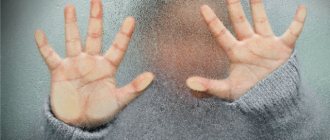ST 156 of the Criminal Code of the Russian Federation.
Failure to fulfill or improper fulfillment of duties for the upbringing of a minor by a parent or other person entrusted with these duties, as well as by a teacher or other employee of an educational organization, medical organization, organization providing social services, or other organization obliged to supervise the minor, if this the act is accompanied by cruel treatment of a minor, is punishable by a fine in the amount of up to one hundred thousand rubles, or in the amount of the wages or other income of the convicted person for a period of up to one year, or by compulsory labor for a term of up to four hundred forty hours, or by correctional labor for a term of up to two years. , or forced labor for a term of up to three years with deprivation of the right to hold certain positions or engage in certain activities for a term of up to five years or without it, or imprisonment for a term of up to three years with deprivation of the right to hold certain positions or engage in certain activities for a term of up to five years or without it.
Commentary to Art. 156 Criminal Code
1. The objective side of the crime is expressed in the form of inaction, since those specified in Art. 156 of the Criminal Code, persons either do not fulfill at all or do not properly fulfill their duties in raising a minor.
2. Failure to fulfill or improper fulfillment of upbringing responsibilities must be coupled with cruel treatment of a minor, which can be expressed both in physical and mental violence, and in the use of other unacceptable methods of education that do not involve violence.
Physical violence consists of beatings, restriction of freedom, torture, and causing any degree of harm to the health of a minor. The commission of any violent crime is more serious than that provided for in Art. 156 of the Criminal Code, and always requires qualification based on the totality of crimes. Mental violence can be expressed in humiliation, insult, ridicule, uttering threats, intimidation, bullying, etc. The use of other unacceptable methods of education can manifest itself in deprivation of food, clothing, sleep and rest, failure to provide medical and other assistance, etc.
3. The corpus delicti is formal; it is recognized as completed from the moment of failure to fulfill or improper fulfillment of duties for the upbringing of a minor, coupled with cruel treatment of him.
4. Special subject of the crime: a) parents, adoptive parents, foster parents, guardians and trustees; b) persons obliged to educate a minor in the process of supervising the latter due to professional (official) duties.
Criminal liability for child abuse
Cruel treatment associated with failure to fulfill the responsibilities of raising a child is prohibited by law under threat of punishment, that is, it is a crime under Article 156 of the Criminal Code of the Russian Federation.
This crime is expressed in action or inaction, that is, in improper performance or failure to fulfill the duties of raising a minor assigned to a person by law, coupled with cruel treatment. In accordance with Art. 156 of the Criminal Code of the Russian Federation, cruel treatment should be understood as: - failure to fulfill or improper fulfillment of responsibilities for raising a child, committed both through action and through inaction, which by its nature or the consequences caused is of a cruel nature: deprivation of food, shoes and clothing, gross violation daily routine determined by the psychophysiological needs of a child of a certain age, deprivation of sleep and rest, failure to comply with basic hygiene standards, which entails, for example, head lice, scabies, etc., failure to comply with doctor’s recommendations and orders for the prevention of diseases and treatment of the child, refusal or evasion of medical care necessary medical care for the child, etc.;
- active actions that run counter to the main responsibilities of the subject of educational activities, which consist in applying unacceptable methods of education and treatment to the child, including all types of physical, mental and sexual violence against children. To find a person guilty of committing this crime, no consequences are required.
A crime is always characterized by direct intent. The guilty person realizes that he is violating the duty to raise a minor, understands that he is treating him cruelly and wants to commit such actions, purposefully failing to fulfill his duties to raise a minor.
The subjects of this crime are parents, adoptive parents, foster parents, guardians and trustees, persons obliged to educate a minor in the process of supervising the latter due to their professional duties.
For committing a crime under Art. 156 of the Criminal Code of the Russian Federation provides for punishment in the form of a fine of up to one hundred thousand rubles or in the amount of wages or other income of the convicted person for a period of up to one year, or
compulsory labor for a term of up to four hundred and forty hours, or correctional labor for a term of up to two years, or forced labor for a term of up to three years with deprivation of the right to hold certain positions or engage in certain activities for a term of up to five years or without it, or imprisonment for a term of up to three years with or without deprivation of the right to hold certain positions or engage in certain activities for a period of up to five years.
In case of failure by parents or other persons replacing them to fulfill the duties of raising and educating children, which does not involve cruel treatment of them, administrative liability arises under Art. 5.35 of the Code of Administrative Offenses of the Russian Federation, and entails a warning or the imposition of an administrative fine in the amount of one hundred to five hundred rubles
Second commentary to Art. 156 of the Criminal Code of the Russian Federation
1. Failure to perform or improper performance of duties means either a complete refusal to fulfill the responsibilities of the perpetrator for raising a child, assigned to him by regulatory legal acts, or such fulfillment (not in full, periodically, etc.) that does not ensure achievement educational goals.
Failure to fulfill or improper fulfillment of responsibilities for raising a minor is not criminal in itself, but only if it is combined with cruel treatment of the child.
2. Cruel treatment is a system of behavior of the perpetrator towards the victim, which is characterized by causing torment and suffering to the child as a result of the use of physical or mental violence and bullying of the victim. It can manifest itself in beatings, causing minor harm to health, threats of violence, mockery, deprivation of food, water, heat, light, etc.
3. The subjective side assumes guilt in the form of direct intent.
4. The subject of the crime is special: parents, adoptive parents, guardians, trustees, adoptive parents, teachers, as well as other employees of educational, training or other institutions required to supervise the minor.
Commentary on Article 156 of the Criminal Code of the Russian Federation
1. The objective side of the crime is expressed in the form of inaction, since the persons indicated in the commented article either do not perform at all (pure inaction) or do not properly perform (mixed inaction) their duties in raising a minor.
2. Failure to fulfill or improper fulfillment of upbringing responsibilities must be coupled with cruel treatment of a minor, which can be expressed both in physical and mental violence, and in the use of other unacceptable methods of education that do not involve violence.
3. Physical violence can be expressed in beatings, restriction of freedom, torture, or causing harm to the health of a minor. It must be borne in mind that the intentional infliction of grievous and moderate harm to health, as well as the torture of a child, form a set of crimes and require additional qualifications under Art. Art. 111, 112 and 117 of the Criminal Code.
Mental violence is an impact directly on the psyche. It can cause either mental trauma or suppress (limit) freedom of expression. This violence can be expressed in humiliation, insult, ridicule, uttering threats, intimidation, bullying, etc.
The use of other unacceptable methods of education may manifest itself in deprivation of food, clothing, sleep and rest, failure to provide medical and other assistance, etc.
4. The crime is recognized as completed from the moment of non-fulfillment or improper fulfillment of the duties of raising a minor, coupled with cruel treatment of him.
5. The subjective side assumes guilt in the form of direct intent.
6. The subject of the crime is special. The circle of special subjects consists of two categories of persons who are responsible for raising a minor:
1) parents, adoptive parents, foster parents, guardians and trustees;
2) persons obliged to educate a minor in the process of supervising the latter due to professional (official) duties.
Cannot be held liable under Art. 156 persons deprived of parental rights. Cases of violent acts committed by them against their minor children should be regarded as crimes against life and health (Chapter 16 of the Criminal Code), freedom, honor and dignity of the individual (Chapter 17 of the Criminal Code).
Judicial practice: sentences and punishment under Art. 156 of the Criminal Code of the Russian Federation
- Resolution of the Plenum of the Supreme Court of the Russian Federation dated... PLENARY OF THE SUPREME COURT OF THE RUSSIAN FEDERATION DECISION dated December 27, 2002 N 29 ON JUDICIAL PRACTICE IN CASES OF THEFT,...
- Resolution of the Plenum of the Supreme Court of the Russian Federation dated... PLENARY OF THE SUPREME COURT OF THE RUSSIAN FEDERATION DECISION of November 15, 2021 N 48 ON THE PRACTICE OF APPLICATION BY COURTS OF LEGISLATION GOVERNING FEATURES...
- Resolution of the Plenum of the Supreme Court of the Russian Federation dated... PLENAUM OF THE SUPREME COURT OF THE RUSSIAN FEDERATION DECISION dated June 25, 2021 N 18 ON JUDICIAL PRACTICE IN CASES OF CRIMES,...
- Decision of the Supreme Court: Determination N 203-APU17-21... THE SUPREME COURT OF THE RUSSIAN FEDERATION Case No. 203-APU17-21 APPEAL DECISION Moscow August 31, 2021 Judicial Collegium for Military Personnel of the Supreme...
- Resolution of the Plenum of the Supreme Court of the Russian Federation dated... PLENAUM OF THE SUPREME COURT OF THE RUSSIAN FEDERATION DECISION dated December 17, 2021 N 43 ON SOME ISSUES OF JUDICIAL PRACTICE IN CASES...
- Decision of the Supreme Court: Resolution No. 310P13 dated... DECISION OF THE PRESIDIUM OF THE SUPREME COURT OF THE RUSSIAN FEDERATION Case No. 310-P13 Moscow January 23, 2014 Presidium of the Supreme Court of the Russian Federation...
- Resolution of the Presidium of the Supreme Court of the Russian Federation dated... PRESIDIUM OF THE SUPREME COURT OF THE RUSSIAN FEDERATION DECISION dated December 5, 2018 N 126-P18 ON RESUMING PROCEEDINGS IN THE CASE DUE TO NEW...
- Ruling of the ECtHR dated 02/14/2017 EUROPEAN COURT OF HUMAN RIGHTS THIRD SECTION CASE “MASLOVA VS. RUSSIAN FEDERATION” (Complaint No. 15980/12) JUDGMENT…
- Decision of the Supreme Court: Determination No. 56-КГ16-46 dated... THE SUPREME COURT OF THE RUSSIAN FEDERATION No. 56-КГ16-46 DETERMINATION Moscow March 6, 2017 Judicial Collegium for Civil Cases of the Supreme Court...
- Decision of the Supreme Court: Determination No. 56-КГ16-46 dated... THE SUPREME COURT OF THE RUSSIAN FEDERATION No. 56-КГ16-46 DETERMINATION Moscow March 6, 2017 Judicial Collegium for Civil Cases of the Supreme Court...
Another comment on Art. 156 of the Criminal Code of the Russian Federation
1. The objective side of the crime is expressed in the form of inaction, since those specified in Art. 156 of the Criminal Code of the Russian Federation, persons either do not fulfill at all or do not properly fulfill their duties in raising a minor.
2. Failure to fulfill or improper fulfillment of upbringing responsibilities must be coupled with cruel treatment of a minor, which can be expressed both in physical and mental violence, and in the use of other unacceptable methods of education that do not involve violence.
Physical violence consists of beatings, restriction of freedom, torture, and causing any degree of harm to the health of a minor. The commission of any violent crime is more serious than that provided for in Art. 156 of the Criminal Code, and always requires qualification based on the totality of crimes. Mental violence can be expressed in humiliation, insult, ridicule, uttering threats, intimidation, bullying, etc. The use of other unacceptable methods of education can manifest itself in deprivation of food, clothing, sleep and rest, failure to provide medical and other assistance, etc.
3. The corpus delicti is formal; it is recognized as completed from the moment of failure to fulfill or improper fulfillment of duties for the upbringing of a minor, coupled with cruel treatment of him.
4. Special subject of the crime: 1) parents, adoptive parents, foster parents, guardians and trustees; 2) persons obliged to educate a minor in the process of supervising the latter due to professional (official) duties.






